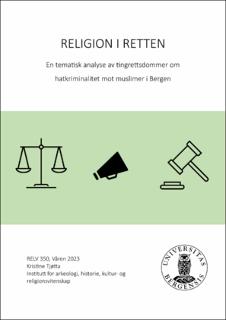Religion i retten: En tematisk analyse av tingrettsdommer om hatkriminalitet mot muslimer I Bergen
Master thesis
Permanent lenke
https://hdl.handle.net/11250/3071443Utgivelsesdato
2023-05-16Metadata
Vis full innførselSamlinger
- Master theses [240]
Sammendrag
De siste årene har hatkriminalitet fått økt oppmerksomhet, både i mediebildet og fra Påtalemyndigheten. Det har spesielt vært økt fokus på hatkriminalitet mot muslimer og muslimfiendtlighet. Antallet anmeldte hatkriminalitetssaker har økt drastisk, spesielt etter at den nye straffeloven trådte i kraft i 2015. Straffelovens paragraf § 185 forbyr diskriminerende og hatefulle ytringer på bakgrunn av noens; hudfarge, nasjonale/etniske opprinnelse, religion eller livssyn, seksuelle orientering, kjønnsidentitet, kjønnsuttrykk eller nedsatte funksjonsevne. Selv om det har vært en økning i antallet hatkrimsaker som anmeldes, er det fortsatt få saker som ender opp i domstolen. Formålet for denne oppgaven er å undersøke hatkriminalitet mot muslimer i Bergensområdet. Prosjektet utforsker hvordan religion tematiseres og forhandles i tingretten, gjennom en kvalitativ tematisk analyse av rettsavgjørelser fra Hordaland tingrett. Materialet består av 18 tingrettsdommer, som omhandler hatefulle ytringer basert på hudfarge, nasjonalitet/etnisitet og religion mellom 2015 og 2022. Fire av disse tematiserer religion. Tre av fire av disse sakene som omhandler religion, dømmes ikke som anti-religiøse hatytringer, men som hatytringer basert på «hudfarge, nasjonal eller etnisk bakgrunn».På tross av det etterlatte inntrykket om at all anti-religiøs hatkriminalitet er rettet mot muslimer, finner jeg også antisemittiske hatytringer i materialet. For å utforske hvordan religion tematiseres i de hatefulle ytringene og i rettsavgjørelsene anvender jeg teoretiske perspektiver på rasisme, rasialisering, interseksjonalitet og andregjøring. Gjennom å se nærmere på rettsavgjørelsene, straffeloven, lovkommentarer og politiets egne definisjon av hatkriminalitet, finner jeg at religionsbegrepet som anvendes i den juridiske konteksten er vagt, og ser ut til å omfavne bare det som kan ansees som «eksplisitt» religion. In the last few years, a lot of media attention has been given to hate crime in Norway, and especially hate crime against Muslims. The numbers of cases reported have increased, and with the new penal code that was adopted in 2015 the prosecuting authority has increased the focus on prevention and investigation of hate crimes. The section 185 in the Norwegian penal code prohibits discriminatory and hateful speech against a person based on their; skin color, national or ethnic origin, religion or life stance, sexual orientation, gender identity or gender expression, or disability. Despite a large increase in the number of hate crime cases that are reported, there are still few cases that makes it to court. This thesis aims to explore hate crime against Muslims in the area surrounding the second largest city of Norway, Bergen. The study explores how the concept of religion is thematized and negotiated in the Norwegian local court, Hordaland district court, through conducting a qualitative thematic analysis on court cases that concerns anti-religious hate speech. This study involves 18 court cases, that concern both hate speech based on skin color, ethnicity, and religion in the period between 2015 and 2022. Four of these thematize religion in some way. Despite the impression from police statistics and media coverage that all anti-religious hate crimes in Norway are against Muslims, I also find antisemitic hate speech in this material. However, I find that three of the four cases concerning anti-religious hate speech, including the one case with antisemitic hate speech, are not considered anti-religious hate crime by the court. These three cases are judged as hate speech based on “skin color, national or ethnic origin”. The thesis draws on theoretical perspectives on racism, racialization, othering, and intersectionality, to explore how religion is thematized in both hate speech and in the court cases, and how religion intersects with other social categories. Looking closer on these court cases, the law, law commentaries and the polices own definition of hate crimes, I find that the term religion in the legal context is vague and seems to only accommodate what can be referred to as “explicit” religion.
